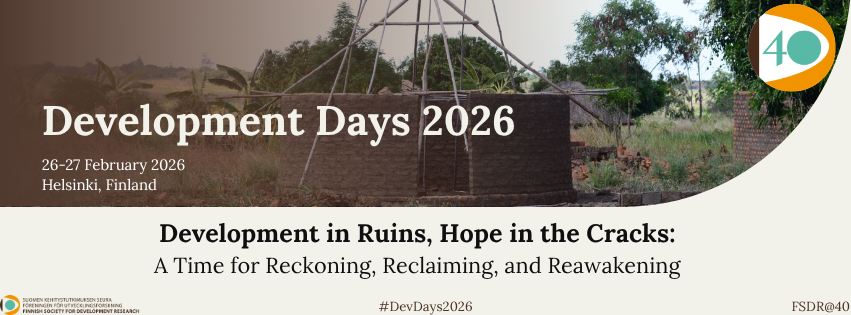Re-imagining Futures from the Edges: Epistemologies and Experiences of Sustainability and Resistance Otherwise
Numerous discussions on sustainability and possible futures are taking place in national and international arenas. The urgency of climate change and biodiversity loss and other complex sustainability problems threatening the future of the planet calls for rapid action and international cooperation. However, global sustainability goals fail to integrate plurality of sustainabilities. Green transitions, for instance, also pose threats to local ecological practices and may take on forms of green colonialism. Building a just and sustainable future requires co-production and enactment of visions developed through diverse voices and knowledges. What are the possibilities for sustainable futures beyond mainstream Eurocentric discourses?How do people in Global South and in the edges of society imagine sustainable futures from and in the crossroads of diverse epistemologies?
This working group addresses diverse knowledges and future imaginaries that provide resistance to ‘development’ framed within colonialist and capitalist world-system. The working group aims at co-producing new ways of conceptualizing sustainable futures from diverse perspectives, including but not limited to youth, immigrant, Indigenous and minoritized peoples. Thus, the focus is on knowledges and practices that are rarely present in academic, political and economic discussions concerning desirable futures or goals and methods for achieving sustainability.
We invite paper presentations discussing conceptual and empirical research findings as well as practice-oriented evaluations or interventions. The session will be held in hybrid format, accepting both onsite and online presentations. We support multilingual communication (English, Spanish, Portuguese, French). Submission of full papers will not be required. However, to facilitate AI-based translation in support of multilingualism, we will ask the presenters to send their presentation visuals in power point format prior to the conference.
Please, submit a paper proposal to the working group by mailing an abstract (maximum 300 words) by 30 November 2025, at the latest, to: tuija.veintie@helsinki.fi
The working group is co-organized by researchers from two on-going research projects: Education in times of multiple crises (EDUCRI) and Ecologies of learning for climate transformations in the lives of Finnish, Senegalese, and Brazilian young people (ECO-YOUNG). Both projects are funded by KONE.
Co-organizers: Tuija Veintie, Indigenous Studies & HELSUS, University of Helsinki (contact:
tuija.veintie@helsinki.fi); Nathaly Pinto, Department of Design, Aalto University; Marinka
Räsänen, Faculty of Educational Sciences, University of Helsinki; Eleonora Lundell, Indigenous
Studies, University of Helsinki & University of Neuchatêl; Monica Lemos, Faculty of Educational
Sciences, University of Helsinki.
